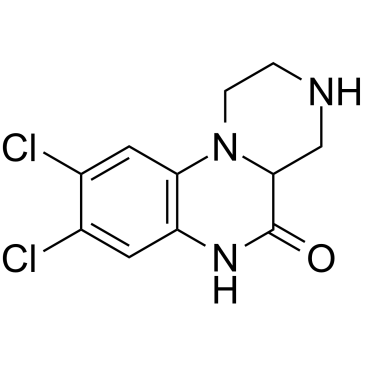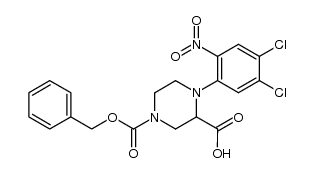(Rac)-WAY-161503
Modify Date: 2024-01-02 19:42:02

(Rac)-WAY-161503 structure
|
Common Name | (Rac)-WAY-161503 | ||
|---|---|---|---|---|
| CAS Number | 75704-24-4 | Molecular Weight | 308.59100 | |
| Density | N/A | Boiling Point | 529ºC at 760 mmHg | |
| Molecular Formula | C11H11Cl2N3O | Melting Point | N/A | |
| MSDS | N/A | Flash Point | 273.7ºC | |
Use of (Rac)-WAY-161503(Rac)-WAY-161503 is a potent, selective, highly affinity 5-HT2C receptor agonist with a Ki of 4 nM and an EC50 of 12 nM. (Rac)-WAY-161503 displays higher affinity for 5-HT2C than 5-HT2A and 5-HT2B receptors. (Rac)-WAY-161503 has anti-obesity and antidepressant effects[1][2]. |
| Name | 8,9-dichloro-2,3,4,4a-tetrahydro-1H-pyrazino[1,2-a]quinoxalin-5(6H)-one |
|---|
| Description | (Rac)-WAY-161503 is a potent, selective, highly affinity 5-HT2C receptor agonist with a Ki of 4 nM and an EC50 of 12 nM. (Rac)-WAY-161503 displays higher affinity for 5-HT2C than 5-HT2A and 5-HT2B receptors. (Rac)-WAY-161503 has anti-obesity and antidepressant effects[1][2]. |
|---|---|
| Related Catalog | |
| Target |
5-HT2C Receptor:4 nM (Ki) 5-HT2C Receptor:12 nM (EC50) |
| In Vivo | (Rac)-WAY-161503 (3-30 mg/kg; intraperitoneal injection; male C57BL/6J mice) treatment dose-dependently decreases locomotor activity, an effect that is blocked by the 5-HT2C/2B antagonist SER-082. Additionally, the decreased locomotor activity produced by 10 mg/kg DOI is potentiated in the 5-HT2A KO mice[1]. Animal Model: Male C57BL/6J mice with hallucinogen 1-(2,5-dimethoxy-4-iodophenyl)-2-aminopropane (DOI)[1] Dosage: 3 mg/kg, 10 mg/kg, 30 mg/kg Administration: Intraperitoneal injection Result: Dose-dependently decreased locomotor activity, an effect that was blocked by the 5-HT2C/2B antagonist SER-082. |
| References |
| Boiling Point | 529ºC at 760 mmHg |
|---|---|
| Molecular Formula | C11H11Cl2N3O |
| Molecular Weight | 308.59100 |
| Flash Point | 273.7ºC |
| Exact Mass | 307.00500 |
| PSA | 44.37000 |
| LogP | 3.05750 |
| Precursor 2 | |
|---|---|
| DownStream 0 | |
![3-Carbobenzyloxy-8,9-Dichloro-2,3,4,4a-Tetrahydro-1H-Pyrazino[1,2-a]-Quinoxalin-5(6H)-One structure](https://image.chemsrc.com/caspic/407/276695-08-0.png)

